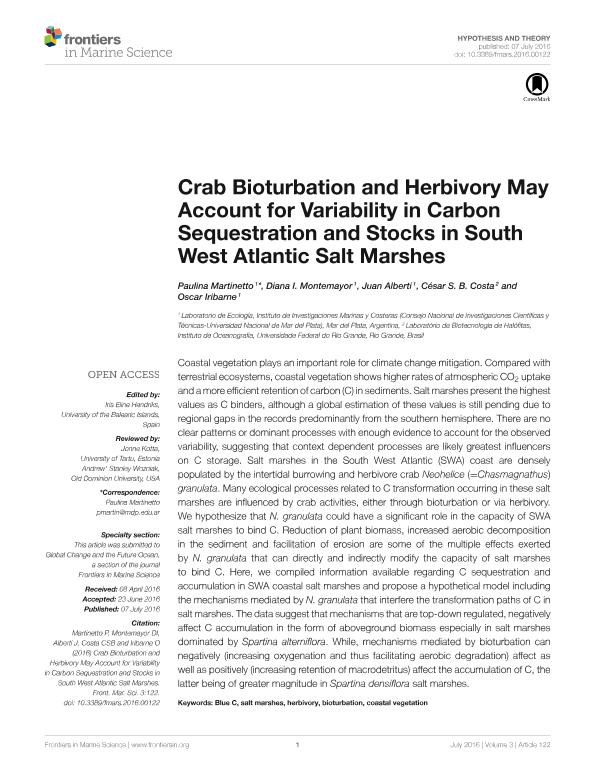Artículo
Crab bioturbation and herbivory may account for variability in carbon sequestration and stocks in south west atlantic salt marshes
Martinetto, Paulina Maria del Rosario ; Montemayor Borsinger, Diana Ireri
; Montemayor Borsinger, Diana Ireri ; Alberti, Juan
; Alberti, Juan ; Costa, César S. B.; Iribarne, Oscar Osvaldo
; Costa, César S. B.; Iribarne, Oscar Osvaldo
 ; Montemayor Borsinger, Diana Ireri
; Montemayor Borsinger, Diana Ireri ; Alberti, Juan
; Alberti, Juan ; Costa, César S. B.; Iribarne, Oscar Osvaldo
; Costa, César S. B.; Iribarne, Oscar Osvaldo
Fecha de publicación:
02/2016
Editorial:
Frontiers Research Foundation
Revista:
Frontiers in Marine Science
ISSN:
2296-7745
Idioma:
Inglés
Tipo de recurso:
Artículo publicado
Clasificación temática:
Resumen
Coastal vegetation plays an important role for climate change mitigation. Compared with terrestrial ecosystems, coastal vegetation shows higher rates of atmospheric CO2 uptake and a more efficient retention of carbon (C) in sediments. Salt marshes present the highest values as C binders, although a global estimation of these values is still pending due to regional gaps in the records predominantly from the southern hemisphere. There are no clear patterns or dominant processes with enough evidence to account for the observed variability, suggesting that context dependent processes are likely greatest influencers on C storage. Salt marshes in the South West Atlantic (SWA) coast are densely populated by the intertidal burrowing and herbivore crab Neohelice (= Chasmagnathus) granulata. Many ecological processes related to C transformation occurring in these salt marshes are influenced by crab activities, either through bioturbation or via herbivory. We hypothesize that N. granulata could have a significant role in the capacity of SWA salt marshes to bind C. Reduction of plant biomass, increased aerobic decomposition in the sediment and facilitation of erosion are some of the multiple effects exerted by N. granulata that can directly and indirectly modify the capacity of salt marshes to bind C. Here, we compiled information available regarding C sequestration and accumulation in SWA coastal salt marshes and propose a hypothetical model including the mechanisms mediated by N. granulata that interfere the transformation paths of C in salt marshes. The data suggest that mechanisms that are top-down regulated, negatively affect C accumulation in the form of aboveground biomass especially in salt marshes dominated by Spartina alterniflora. While, mechanisms mediated by bioturbation can negatively (increasing oxygenation and thus facilitating aerobic degradation) affect as well as positively (increasing retention of macrodetritus) affect the accumulation of C, the latter being of greater magnitude in Spartina densiflora salt marshes.
Palabras clave:
Bioturbation
,
Blue C
,
Coastal Vegetation
,
Herbivory
,
Salt Marshes
Archivos asociados
Licencia
Identificadores
Colecciones
Articulos(IIMYC)
Articulos de INSTITUTO DE INVESTIGACIONES MARINAS Y COSTERAS
Articulos de INSTITUTO DE INVESTIGACIONES MARINAS Y COSTERAS
Citación
Martinetto, Paulina Maria del Rosario; Montemayor Borsinger, Diana Ireri; Alberti, Juan; Costa, César S. B.; Iribarne, Oscar Osvaldo; Crab bioturbation and herbivory may account for variability in carbon sequestration and stocks in south west atlantic salt marshes; Frontiers Research Foundation; Frontiers in Marine Science; 3; JUL; 2-2016; 122-126
Compartir
Altmétricas



